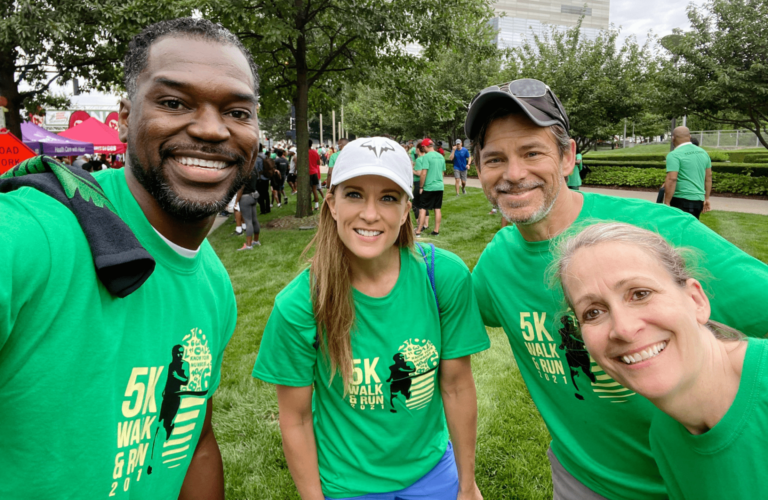Champion of Impact: Elon Simms is here to serve
By Elon Simms

Elon Simms didn’t grow up with much, but his single mother — who worked in a Whirlpool factory, served tables, and sold Mary Kay to provide — still found ways to give back. It inspired Simms to pursue a life of service. As track team captain and a Big Ten champion athlete at Ohio State University, Simms studied social work. He then started his professional life by helping families as a child welfare caseworker. He eventually was tapped to lead community affairs for the City of Columbus. Now, Simms is VP of Community Impact at Crane Group. In his role, he works to understand community needs and how Crane Group can help address them through strategic partnerships, board service, volunteerism and funding. Here, meet the husband, father of two young boys, and always-joyful community volunteer.
Q: You were a full-scholarship track athlete at Ohio State who won three Big Ten championships in the 4×400 meter relay, among other successes. What did track teach you about life?
A: First, it taught me about teamwork. Second, it taught me about relationships; you learn how to connect with people. Thirdly, it taught me visioning. It’s really weird to say, but one of the things that helped me with races was to envision how the race was going to go. With hurdles, I would envision every barrier — how I would get over it, what I would do if it didn’t go the way I planned. Now, visioning is part of my life. I sit down and picture how I want to approach something. How it will go. If I mess up, how I will respond. So sports really gave me the ability to picture how I was going to move through something. Lastly, it taught me resilience — mental toughness.
Q: Your first big venture into giving back was sparked by tragedy. How so?
A: Between my senior year of high school and college, a friend on the track team was killed. So we created a track meet to raise money for a scholarship fund in his honor. I grew up in a home where my mom always instilled the value of giving, even when we didn’t have as much to give. My understanding of giving came from a faith background. But this event was my first big foray into giving.
Q: Why have you dedicated your life to this work?
A: For me, when you learn something, you should be moved to do something about it.
Q: What is the best part of your work?
A: The giving. I mean, once I found out that there were roles at corporations to support community impact, I thought, “Oh my gosh, who wouldn’t want to do that kind of work?!” To have been in a space where I personally experienced what support can look like to being in roles where I’ve been able to provide that support… the beauty is super exciting. Crane has been amazing. To get to think about who we can potentially partner with and who we can move forward and how we can influence change and guide change in this community — who gets paid to do that? It’s awesome. The best part is waking up every day thinking about how we can make a difference.
Q: What community work or organizations are you especially passionate about, and why?
A: There are just so many. I’m all for organizations that are really doing the work to effect change that reduces health inequities and the racial wealth gap and creates access to more opportunities that folks like me haven’t had access to before. Those are the organizations I’m passionate about, and Crane is too. George Floyd wasn’t just a moment for us. We’re leaning into what it means to truly create sustainable change. The organizations doing that who are true to their work and their word — I’m especially passionate about those organizations.
Q: What is your most memorable give-back moment?
A: When The Women’s Fund was establishing its enduring progress initiative to empower Black women and girls, I was talking a lot with Women’s Fund CEO Kelley Griesmer. It was shocking to hear that organizations led by women of color receive so little funding. So I was meeting with the group of leaders within Crane Group that decides on where we give grant money. I was pitching this enduring progress fund. And the group was like, “Elon — stop talking. This is approved.” It made me teary. It was inspiring to see the company make such a quick decision on that. It was inspiring to see the family respond in that way.
Q: You credit your mother with instilling in you your strong moral compass. What does she think about how you’ve chosen to share your talents with the world?
A: I don’t think she fully understands what I do (laughing)! I’m working to make lives better — she understands that much. And that alone makes her proud.